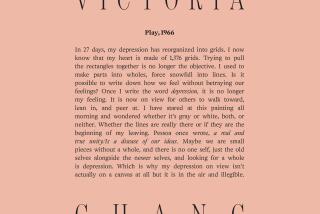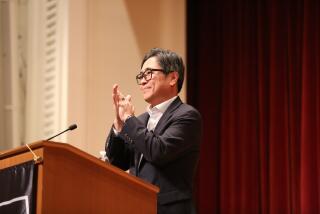At heart, a Romantic
PITY the poets of the mid-20th century. Dead for only a few decades, Berryman, Bishop, Lowell and Merrill -- to name but a few -- sit in libraries gathering dust. Time and familiarity have silenced their voices. The world has sped beyond them.
What does it matter, then, to say that Theodore Roethke was one of the most honored? To cite the awards he won in his lifetime (a Pulitzer, a National Book Award, a Bollingen) and posthumously (a second National Book Award) only puts the man further behind glass and distances us from the pleasures of his verse.
--
Is that dance slowing in the mind of man
That made him think the universe could hum?
The great wheel turns its axle when it can;
I need a place to sing, and dancing-room,
And I have made a promise to my ears
I’ll sing and whistle romping with the bears.
--
His cadences may seem archaic today, derivative riffs on Auden and Yeats, and his subject, often himself, unrelentingly personal. But to drop into Roethke’s life and lines, thoughtfully selected by Edward Hirsch, is to remember that poetry is, even in its most secular expression -- perhaps best in its most godless expressions -- a religious art.
--
As a blind man, lifting a curtain, knows it is morning,
I know this change:
On one side of silence there is no smile;
But when I breathe with the birds,
The spirit of wrath becomes the spirit of blessing,
And the dead begin from their dark to sing in my sleep.
--
A “gritty, roaring, postwar American version of Rilke” is how Hirsch describes him in his introduction, and the analogy is apt. Roethke wrote that his poems are “nuggets of observation and ... spiritual wisdom ... [gained] in the course of a conventional albeit sometimes disordered existence.” And in his longer verse, he attempts “to catch the very movement of the mind itself, to trace the spiritual history of a protagonist ... of all haunted and harried men.”
Blake, Wordsworth, Henry Vaughan and Sir John Davies -- Roethke channeled the Romantic, if not the metaphysical, and the Elizabethan traditions of English literature while lending to them a distinctly modern idiom.
--
I have known the inexorable sadness of pencils,
Neat in their boxes, dolor of pad and paper-weight,
All the misery of manilla folders and mucilage,
Desolation in immaculate public places....
--
His poetry not only brushed up against the sadness of the material world and the dross of life: It honored the deeper aspirations within us all. It is the breadth of his vision -- from the muck and mire to the mystical and ephemeral -- that makes his verse so rewarding, so poignant and at times even comical. Who else but Roethke could so address a slug?:
--
I’m sure I’ve been a toad, one time or another.
With bats, weasels, worms -- I rejoice in the kinship.
Even the caterpillar I can love, and the various vermin.
But as for you, most odious --
Would Blake call you holy?
--
His poetry is, if nothing more, a faithful reflection of his life. You don’t need to read a biography to know that he was born in Saginaw, Mich., at the turn of the last century. That he was the son of a Prussian gamekeeper who immigrated to this country to operate one of the largest greenhouses in the Midwest. That he struggled with mental illness (misdiagnosed first as schizophrenia, then correctly as manic-depression) and endured a range of treatments (hydrotherapy, shock and finally his own -- alcohol). That he was a devoted teacher.
Roethke was a man unafraid of irrational joy yet still intimate with darkness. At his best, you find him straining for the right language, vocabulary or metaphor that will convey -- without paradox -- his separation and connection to the world. At his worst, his attempts crumble in a disjointed litany of imagery, dialogue and rhyme; at his most desperate, you read the depth of his fear in his more facile conclusions, a forced hopefulness that occasionally mars his work but reveals him to be so human that it might break our hearts to stand inside his skin.
Most important, however, is the questing, the yearning that one finds in the poems. It is a search: a spiritual, epistemological struggle to try to connect himself with himself. “We think by feeling,” he wrote aphoristically. “What is there to know?” The sensual world always provided the answer. “Am I but nothing, leaning toward a thing?” he asks. In one poem, “The Manifestation,” not included in this collection, he writes,
--
Many arrivals make us live: the tree becoming
Green, a bird tipping the topmost bough,
A seed pushing itself beyond itself,
The mole making its way through darkest ground,
The worm, intrepid scholar of the soil --
Do these analogies perplex? A sky with clouds,
The motion of the moon, and waves at play,
A sea-wind pausing in a summer tree.
What does what it should do needs nothing more.
The body moves, though slowly, toward desire.
We come to something without knowing why.
--
Nature is the objective correlative in a Roethke poem, and he remains today one of our finest observers of the natural world. But the birds, the flowers and the worms -- so often the worms and his own unique identification with the vulnerable doe, the snake, the hummingbird -- provide a window on the turbulent and constant rhythms of life.
The master of the short poem, Roethke turned each line into a poem unto itself, alive to its own melody and sound and cadence. He disdained passivity, surplus adjectives and any word that didn’t have its own velocity. And he valued the unique shape of the poem -- the short lines, the long lines and the white space in between -- but it was in the longer poems that his meditations play out.
Forty-one years after its posthumous publication, “The North American Sequence” still sings with the grace, breadth and consistency that make it one of America’s finest poems, and certainly one with a tragic back story. On Aug. 1, 1963, one year before the poem was published, Roethke was found in a friend’s swimming pool, dead of a heart attack.
In the sequence’s opening section, “The Longing,” we find a familiar pattern: staccato rhythms, disjointed imagery, a maddening, confounding logic, as if the poet were lost and struggling to find his place.
--
On things asleep, no balm:
A kingdom of stinks and sights,
Fetor of cockroaches, dead fish, petroleum,
Worse than castoreum of mink or weasels,
Saliva dripping from warm microphones,
Agony of crucifixion on barstools.
--
This tessellation of imagery -- one line bridged to the next by the scantest association, like a shadow whose object is unseen -- creates a tension, a foreboding, that relaxes and resolves when Roethke stretches his legs and lets a longer melodic line develop.
--
In the long journey out of the self,
There are many detours, washed-out interrupted
raw places
Where the shale slides dangerously
And the back wheels hang almost over the edge
At the sudden veering, the moment of turning.
--
Here is a man, long familiar with the mad and the dead, who in moments of the body’s failing -- and transformation -- reminds us that there is more to this world than what we can immediately see. Understanding is often achieved not through a denial of nature but through a certain intimacy with it.
--
All finite things reveal infinitude:
The mountain with its singular bright shade ...
Odor of basswood on a mountain-slope ...
Silence of water above a sunken tree ...
A ripple widening from a single stone
Winding around the waters of the world.
--
Who were the poets of the mid-20th century, and why do they deserve our renewed attention? They were among the first to see something new, something dark in American life. In their verse we read a certain dread, an emptiness cut by materialism, by inequality, by the distance between who we are and who we can become. In their words, their intellect and verse, they tried to explore and bridge the gap.
“Is that dance slowing in the mind of man?” Roethke asks us. Yes, it is, but to read his poems is once again to be reminded of the song.
More to Read
Sign up for our Book Club newsletter
Get the latest news, events and more from the Los Angeles Times Book Club, and help us get L.A. reading and talking.
You may occasionally receive promotional content from the Los Angeles Times.







